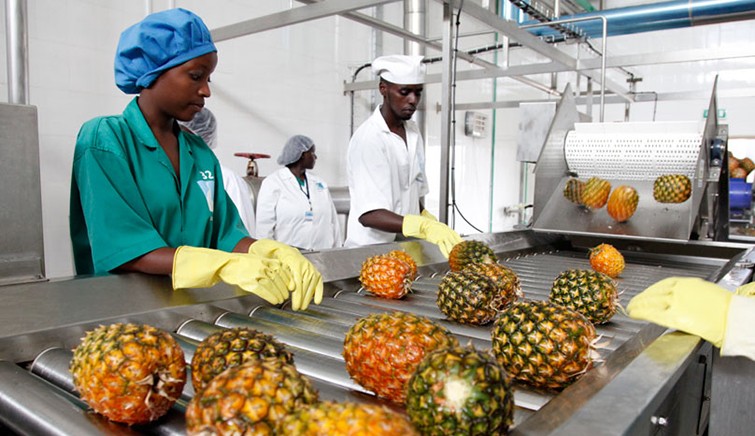Africa’s food processing sector is not just an industry but a critical cornerstone for achieving a food-secure and prosperous continent. By investing in and expanding this sector, we can unlock immense potential that will uplift millions of lives, create sustainable jobs, and drive economic growth across the region.
Africa is a continent rich in natural resources and agricultural potential, yet it continues to face significant challenges in achieving food security for its growing population. One of the key factors that can help address this issue is improving food processing capabilities across the continent. By enhancing and expanding food processing industries in Africa, the continent can unlock its full potential for sustainable food production and distribution, ultimately leading to improved food security for its people.
The current landscape of food production in Africa is marked by an abundance of agricultural resources and diverse culinary traditions. However, the majority of this potential remains untapped due to limited processing capabilities. By enhancing food processing, we can significantly reduce post-harvest losses, ensuring that the bounty of our farms reaches consumers in the freshest and most nutritious form. This is not merely a matter of efficiency; it is a pathway to combating hunger and malnutrition, which continue to plague many communities across the continent.
Food processing is a critical component of the food supply chain, as it involves transforming raw agricultural products into finished goods that are safe, nutritious, and convenient for consumption. In Africa, many smallholder farmers produce a surplus of agricultural products but lack the means to properly process, preserve, and distribute these goods. This results in significant post-harvest losses, which ultimately impact food security and economic development in the region.
- Advertisement -
Investing in food processing infrastructure and technology in Africa can help address these challenges by increasing the efficiency of the food supply chain, reducing post-harvest losses, and improving the quality and safety of food products. By adding value to raw agricultural products through processing, farmers can fetch higher prices for their goods, thus increasing their incomes and livelihoods. Additionally, processed food products have a longer shelf life, making them more accessible to consumers and reducing food waste.
Investing in food processing aligns with global sustainability goals. It promotes the use of local ingredients, reduces dependence on imports, and minimizes food waste. As we embrace modern technologies and sustainable practices, we can transform our food systems to be more efficient, environmentally friendly, and capable of adapting to climate change challenges.
A robust food processing sector can stimulate local economies. By fostering small and medium enterprises, we can empower entrepreneurs, especially women and youth, to participate in the value chain. This will lead to job creation, skill development, and greater economic resilience. As we build a network of food processors, we not only enhance food security but also establish a vibrant marketplace that encourages innovation and competition.
Africa has tremendous potential to develop its food processing industry, as the continent is home to a wide variety of agricultural crops and livestock that can be processed into a range of value-added products. From fruits and vegetables to grains and meats, Africa has the natural resources and human capital to support a thriving food processing sector. By investing in research and innovation, as well as training and capacity building for food processors, Africa can harness this potential to improve food security and support economic growth.
Furthermore, developing the food processing industry in Africa can create new opportunities for job creation and entrepreneurship, particularly in rural areas where agriculture is the primary source of livelihood for many people. By establishing food processing facilities and supporting local businesses, Africa can stimulate economic development, reduce poverty, and enhance food security for its population.
- Advertisement -
In addition, a robust food processing industry in Africa can help the continent become more self-sufficient in meeting its food needs, reducing its reliance on food imports and enhancing its food sovereignty. By processing and preserving locally grown agricultural products, Africa can build a more resilient food system that is less vulnerable to external shocks such as price fluctuations and supply chain disruptions. This will not only improve food security for Africa but also contribute to the overall stability and prosperity of the continent.
Promoting food processing in Africa can help address nutritional challenges by increasing the availability of diverse and nutritious food products for consumers. By processing and fortifying staple foods with essential nutrients, such as vitamins and minerals, Africa can combat malnutrition and improve the health and well-being of its population. This is especially important in the context of rising rates of obesity and diet-related diseases in Africa, which can be addressed through the availability of healthier processed food options.
Furthermore, enhancing food processing capabilities in Africa can help the continent become more competitive in the global market, by producing high-quality food products that meet international standards and consumer preferences. By improving food safety and quality control measures, Africa can export processed food products to other regions and generate additional economic revenue. This will benefit the food processing industry and create opportunities for trade and economic growth across various sectors.
The food processing sector is a vital opportunity for Africa to secure its future. By prioritizing this industry, we can create a self-sufficient and thriving continent where every individual has access to nutritious food, and where economic prosperity is within reach for all. Let us seize this moment to invest in our food processing capabilities and pave the way toward a brighter, more sustainable future for Africa.
In conclusion, Africa’s food processing industry holds the key to achieving food security for the continent by addressing post-harvest losses, improving the efficiency of the food supply chain, creating new opportunities for job creation and entrepreneurship, enhancing food sovereignty, promoting nutritional security, and increasing competitiveness in the global market. By investing in food processing infrastructure, technology, and capacity building, Africa can unlock its full potential for sustainable food production and distribution, ultimately leading to a more resilient and prosperous future for its people.










